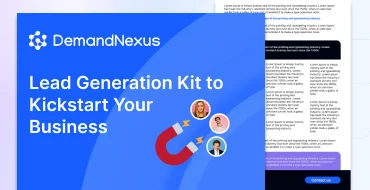Introduction: What is the SDR Skills & Career Path?
Sales Development Representatives (SDRs) are crucial players in the sales process, acting as the bridge between marketing and sales to generate and qualify leads. Mastering SDR skills can lead to rewarding career paths in sales, marketing, and beyond. This guide will delve into the necessary skills, potential career paths, and strategic insights to help you thrive as an SDR, aligning with DemandNexus’s mission of empowering sales and marketing teams through technology-driven strategies.
Understanding the SDR Role
What Does an SDR Do?
An SDR focuses on prospecting and lead qualification, ensuring that potential clients are ready for conversations with the sales team. They work closely with marketing teams, leveraging intent data and predictive analytics to identify high-value prospects—a cornerstone of DemandNexus’s services.
Quick Tip: Crafting Rapport-Building EmailsEmails are an SDR’s first handshake. To build rapport, keep them short and prospect-centric, using intent data from DemandNexus to personalize. For instance, if a prospect commented on a blog about CRM efficiency, start with, “I saw your insight on CRM challenges—our tool simplifies that.” This shows you’ve done your homework, boosting reply rates by up to 10%. Avoid generic pitches; focus on their needs, like solving a specific pain point. A clear call-to-action, like scheduling a 15-minute chat, seals the deal. Practice this daily to turn cold emails into warm conversations, setting the stage for qualification
Why Is the SDR Role Important?
The SDR role is critical for streamlining the sales process and improving conversion rates. By identifying qualified leads, SDRs help sales teams focus their efforts where they’re most likely to succeed. With DemandNexus’s emphasis on precision and reliability, SDRs play a vital role in executing data-backed marketing strategies.
Top SDR Skills for Career Growth
- Communication and Interpersonal Skills: You need to articulate value propositions clearly, listen actively, and engage prospects through various channels such as email, phone, and social media, leveraging strategies like those in B2B cold calling services
- Research and Data Analysis: SDRs must be proficient in gathering insights from intent data and predictive analytics. Familiarity with DemandNexus tools, such as account-based marketing platforms, enhances an SDR’s ability to target prospects intelligently.
- Time Management: Managing multiple leads and tasks requires excellent organizational skills. SDRs must prioritize their activities to maintain consistent follow-ups and outreach.
- Technical Proficiency: An understanding of CRM systems like Salesforce and marketing automation tools is essential for tracking and nurturing leads effectively, complementing skills needed to find a call center for scalable outreach
- Resilience and Adaptability: Sales can be challenging, and SDRs must be resilient in the face of rejection. Adapting to new strategies and technologies is crucial as the digital landscape evolves.
Skill Snapshot: Turning Rejection into Opportunity
Rejection is part of an SDR’s day, but resilience turns it into growth. Instead of dwelling on a ‘no,’ analyze why—maybe the email landed at a bad time. DemandNexus’s analytics help, showing open rates or engagement patterns to tweak approaches. For example, if data reveals mornings get more replies, shift your schedule. This can cut rejection rates by 15%. Treat each response as feedback: a short subject line might outperform a long one. By staying curious and data-driven, SDRs build confidence and refine skills, preparing for roles like Account Executive where persistence pays off. Embrace rejection as a step toward mastery
Career Pathways for SDRs
Transitioning to Account Executive
Many SDRs aspire to become Account Executives (AEs), a role focused on closing deals and managing client relationships. The skills and experience gained as an SDR lay a strong foundation for this transition.
Moving into Marketing
SDRs with a passion for data and strategy may transition into marketing roles, utilizing their understanding of lead generation and customer behavior.
Leadership and Strategy Roles
Strategies for Excelling as an SDR
Leveraging Data-Driven Approaches
Continuous Learning and Development
Stay informed about industry trends and advancements. DemandNexus encourages a forward-thinking mindset, embracing new technologies and methodologies.
Networking and Mentorship
Connect with industry leaders and peers to gain insights and guidance. Networking can open doors to new career opportunities and collaborative ventures.
Conclusion
Mastering SDR skills and understanding potential career paths can propel you toward success in sales and marketing. For those interested in optimizing their SDR roles or exploring DemandNexus solutions, like inbound appointment setting, consider reaching out or exploring our comprehensive suite of services for demand generation.
FAQs
What Are the Benefits of a Career in Sales Development?
A career in sales development offers skill-building opportunities, career advancement potential, and exposure to dynamic, results-driven environments.
How Can I Improve My SDR Skills?
Focus on developing your communication abilities, technical knowledge, and adaptability. Engage with professional development resources and training programs.
What Tools Are Essential for SDRs?
CRM systems, marketing automation platforms, and data analytics tools are essential for modern SDRs. Expertise in these areas can enhance your effectiveness and efficiency.
How Does SDR Performance Impact Business Growth?
By qualifying leads and ensuring a steady pipeline, SDRs directly contribute to an organization’s revenue growth and marketing efficiency.
What Is the Future Outlook for SDRs?
With the rise of AI and data-driven marketing, SDRs who embrace these technologies will find themselves highly sought after in the evolving digital landscape.
Author



